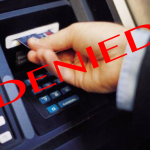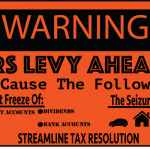Craig Thomas
Latest posts by Craig Thomas (see all)
- Chris Feels Victorious - September 8, 2016
- Are You At Risk of a Levy? - May 26, 2016
- 3 Ways To Survive Your Spouse’s Tax Troubles - February 15, 2016
What is a Federal Tax Lien?
A federal tax lien is the government’s legal claim against your property when you neglect or fail to pay a tax debt. The lien protects the government’s interest in all your property, including real estate, personal property and financial assets.
When Does the IRS File a Tax Lien?
The IRS files a tax lien against your property when you have failed to pay your back tax debt. Before a lien is filed, the IRS must first send out a Notice and Demand for Payment letter. If you don’t respond by full-paying your tax liability, the IRS is allowed to file a tax lien against certain property or assets. This allows the IRS to protect the interests of the government. The tax lien lasts until you pay your tax liability in- full or until the statute of limitations runs out, typically ten years.
Consequence of a Tax Lien?
Once a lien is filed, it becomes public record that the IRS has a claim on your property. The tax lien protects the IRS as a creditor and allows the IRS to collect its due. Tax liens also give the IRS the right to seize property, and this may happen if you do not take action to begin repaying your tax liability.
The filing of a tax lien will appear on your credit report and hurt your credit rating. In fact, the filing of a lien can result in an immediate 100-point drop to your credit score. When a tax lien appears on your credit history, it may hurt you in the following ways:
1. Prevent you from buying home
2. Increases finance cost when buying a car
3. More chance of being rejected for a lease
4. Difficult in getting a credit card
Another problem is that many employers now check your credit report. A tax lien could ultimately affect you getting (or keeping) a job you want.
How To Get Rid of an IRS Tax Lien?
Generally, there is little that can be done to prevent the IRS from filing a tax lien against you if you do not pay your tax liability in-full. If you can borrow the money and pay off your tax debt, do it. Chances are good you will pay less in interest to the source you borrow from than you will pay to the IRS. Paying your tax debt down below the $25,000 level may help as well, but there are no guarantees.
If you find that you cannot full-pay your tax bill and are in need of having your IRS lien withdrawn or discharged, consult a tax professional. An expert in the field of ‘tax resolution’ can help analyze your situation and determine your best course of action.







